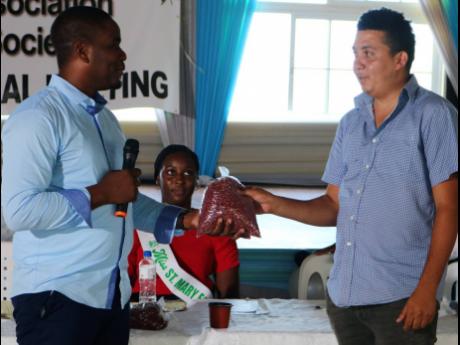Red peas revolution under way
THE PRESENTATION of five pounds of red peas to farmer Charles Lawton at the recent annual general meeting of the St Mary Association of Branch Societies (SMABS), at the Anglican Church Hall in Port Maria, was the first step in what is admittedly a very ambitious programme by president of the association, Fabian Rhule, to begin address Jamaica’s heavy dependence on imported red peas.
For 2021, Jamaica imported 7,424 tonnes of read peas valued at US$9.4 million, according to the Ministry of Agriculture, Fisheries and Mining.
Given the fact that this legume in a staple on the Jamaica menu – rice and peas, red peas soup, and stewed peas, just to name a few dishes, Rhule is confident that if he gets the necessary support to expand the programme, the return on investment in terms of food nutrition and security, as well as foreign exchange savings, will be tremendous.
He has already sourced 500 pounds of red peas to be distributed to the members of the St Mary Association of Branch Societies in 50-acre segments, with the farmers also given one bag of fertiliser. Rhule said he has already secured an agreement for a buyer to take off all the peas produced.
Participants who will be selected are from schools with an active Jamaica 4-H Club, Irish potato farmers who suffered significant losses in the 2022-23 crop, due to the devastating impact of the drought, and young farmers. The SMABS will sponsor the cultivation of 50 acres of the legume and provide fertiliser as a sort of pilot project. It also intends to lobby the Ministry of Agriculture, Fisheries and Mining through the Rural Agricultural Development Authority (RADA) to partner with it on this venture to match its contribution to the project.
The SMABS also plans to collaborate with RADA through its extension officers to conduct training, using the farmer field school methodology.
Rhule explained that while farmers will have the option to sell their produce on the open market, he has a buyer on standby who has committed to taking off all the crop, should that become necessary. In fact, this buyer is willing to sign sale contracts with the farmers, even before one pea grain is planted.
“There is no way the farmers can lose. We are providing the planting material and providing some amount of inputs and providing a guaranteed market. It is my hope to duplicate this venture on a national scale, providing plant protein at a very reasonable rate, while slowly closing the door on imports,” Rhule told The Gleaner.Dectum ia vigna ere qua is tero

